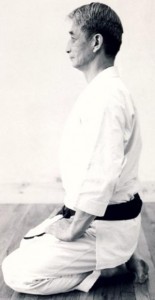I was recently asked about how to anticipate what move somebody is about to attack you with. The guy was very much looking for a way to be able to stay ahead of the game.
I think that he was a bit disappointed in my initial answer, until I explained in more depth. The initial answer is that you DON’T try to anticipate the opponents actual attack.
Just to clarify, anticipate whether or not they are actually going to attack you by all means, but don’t try to anticipate that they will kick or they punch, or they will . . . . . whatever!
If you are trying to think too hard about what he/she/they are going to do next, the thought process will actually slow you down. Assuming that you are in a pre-fight situation where somebody is threatening you, shouting and swearing, psyching themself up for an attack; then you should really be looking to engage their mind by talking in order to distract them whilst lining them up for a pre-emptive strike.
However, for the sake of argument lets assume that for whatever reason you do not get the chance to perform a pre-emptive strike. Maybe the attacker did not get close enough, maybe he knew that you are a capable adversary so kept his distance . . . . . whatever. But you are now in the position where he is about to attack from a fraction out of your pre-emptive striking range. You know it’s coming, but you don’t know what form the attack will take.
Should you try to anticipate what the actual attack will be?
If you anticipate a punch and prepare for it, then he kicks instead you could be in trouble. If you anticipate a kick and prepare for it, then he just rushes in and grabs you, again you could be in trouble.
It is always best to be taking the lead rather than responding (action rather than reaction), but this may not always possible. So how do you react when you haven’t got a clue what the actual form the attack about to launched at you will actually take?
Well there are several things that you need.
Firstly, you need an automatic deeply drilled response that comes out automatically without you having to think about it. That is why we practice basics over and over and over and over again. So when you need them, you can respond automatically without having to be slowed down by “thinking” about what you should be doing or how you should be doing it.
Some form of reality based training or pressure training is good too, so that you don’t “freeze” under the effects of adrenalin. However, if you have experience in real altercations this may not always be necessary.
However, the calmer you can keep your mind, the more likely you are to find an instinctive response to whatever comes at you. If your mind is running away with “oh my god, he’s bigger than me”, (or similar thoughts); you are likely to hesitate. This is something I’ve discussed before in more depth before.

There are a number of elements to our training which assist in calming the mind in these situations. Most obviously, a number of martial arts include some form of meditation (moksu) during the class, where you breathe deeply and clear the mind.
Physical technique done properly should be performed with a relaxed body. The more you relax your body in training, the more your mind will follow and relax too (as body and mind are linked). This is probably more important in many ways than the meditation (just my humble opinion).
Many martial arts also put an emphasis on diaphragmatic breathing (especially if they meditate). This type of breathing is central to Yoga, Tai Chi and any discipline that is about relaxation, so there’s another clue. Diaphragmatic breathing can be used to calm the mind and body in any situation from meditation, traffic jams, problems with work/relationships, through to a physical confrontation. As it relaxes both the mind and body, you can see why it is an integral part in the execution of technique within many traditional martial arts.
So if you can keep your mind calm, relaxed and free from the distraction of having to actually think, then instincts and intuition take over. Your ability to deal with any random attack and counter with a well-drilled response will be greatly increased. An instinctive response will always be faster than a calculated thought out response.
That is why we do not try try to anticipate what the actual attack will be, as by doing so we limit our response options to what we expect will come at us; and by-pass our intuitive nature.
